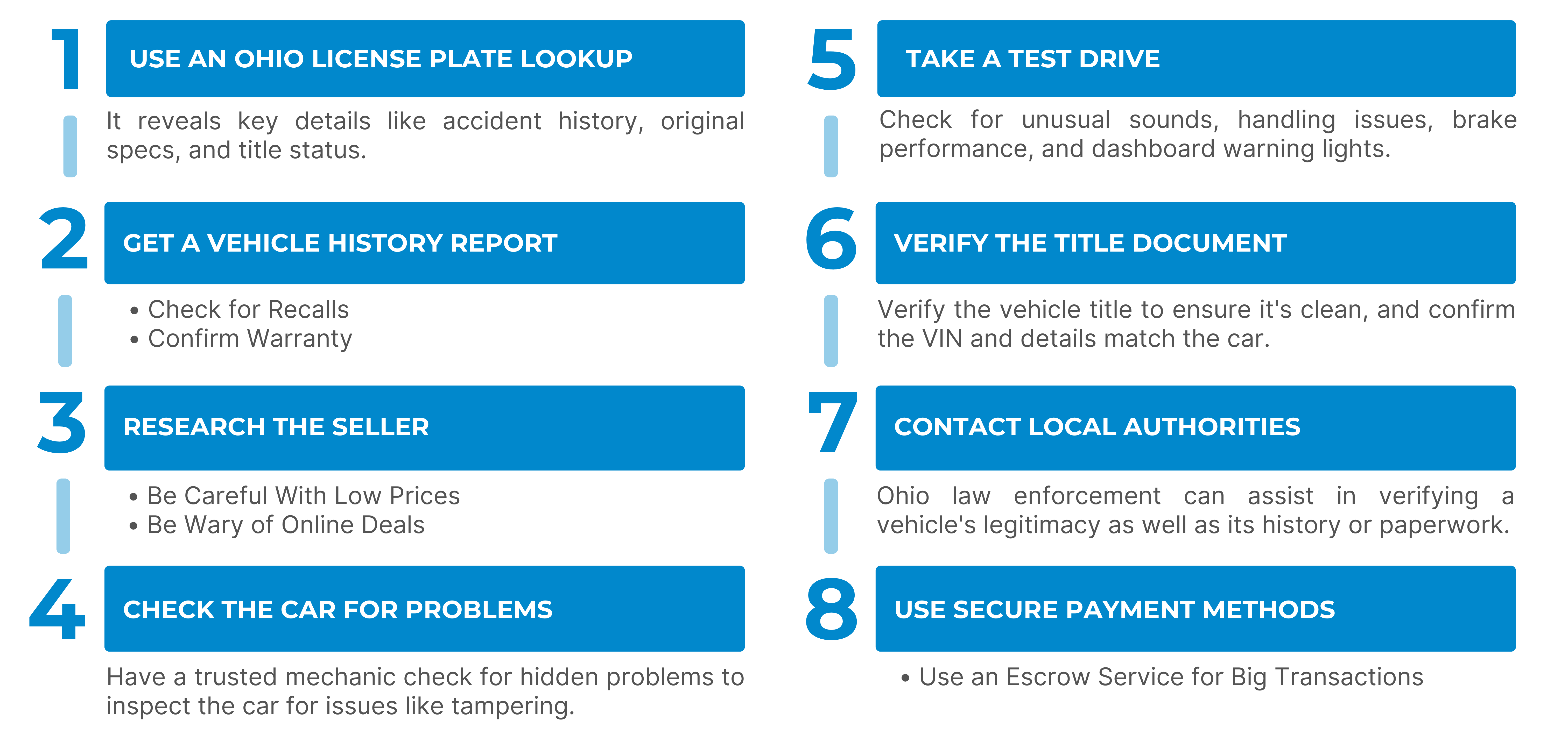
Ohio has had a recent increase in used car fraud, making it very important for buyers to be cautious. Scams like rolling back odometers or selling stolen cars are putting people at risk of losing plenty of money. This guide looks at some recent fraud cases in Ohio and shares practical tips to help you stay safe. In addition, it explains how tools like an Ohio license plate lookup for owners can protect you.
High-Profile Used Car Fraud Cases in Ohio
One of the most alarming cases involved a Cleveland-based dealership accused of selling vehicles with tampered odometers. The dealership reportedly rolled back odometers on dozens of cars, inflating their value by thousands of dollars. Buyers, unaware of the fraud, faced costly repairs soon after purchase.
In another case, authorities in Columbus uncovered a stolen vehicle ring where cars were sold with fake titles. The buyers, thinking they had scored great deals, later discovered that their vehicles were flagged as stolen. This leaves them without both their money and their cars.
The Ohio Attorney General’s Office has reported a rise in such schemes. More and more criminals are leveraging loopholes in vehicle documentation to defraud buyers.
Victims could have avoided these pitfalls with the timely use of license plate lookup for Ohio owners.
How to Protect Yourself from Used Car Fraud
Although the increase in fraud cases is worrying, buyers can take several steps to stay safe:

1. Use an Ohio License Plate Lookup
An Ohio license plate search reveals important details about a car’s history like accident history, original specs, and title status. This helps uncover issues like mileage tampering or salvage titles, giving you the confidence to make a smarter choice.
2. Get a Vehicle History Report
Services like NMVTIS provide additional details, such as basic specs and odometer readings.
-
Check for Recalls
Use the National Highway Traffic Safety Administration (NHTSA) website to see if the car has unresolved recalls. Addressing these is essential for safety.
-
Confirm Warranty
If the car has an active warranty, ask for proof and check its terms with the provider.
3. Research the Seller
For dealerships: Check reviews and Better Business Bureau (BBB) ratings.
For private sellers: Conduct a background check with DMV and research social media footprints.
-
Be Careful With Low Prices
If the price seems too good to be true, it probably is. Research the car’s market value and be cautious of unusually cheap deals.
-
Be Wary of Online Deals
- Avoid sending money without seeing the car.
- Use trusted platforms (e.g. Autotrader, Cars.com, Car and Driver) and meet sellers in person.
4. Check the Car for Problems
Look for signs of tampering, such as:
- Misaligned odometer numbers
- Unusually low mileage for the car’s age
- Mismatched paint or parts
- Scratches or tool marks around screws and fasteners in the dashboard
- Missing or damaged Vehicle Identification Number (VIN) plates
- Inconsistent wear and tear between the interior and exterior
- Altered service records or missing pages
- Unusual gaps between body panels or doors
- Repainted areas that do not match the original color under closer inspection
- Faulty or inconsistent functionality of electronic components, such as the odometer display.
Have a trusted mechanic inspect the car for hidden issues.
5. Take a Test Drive
Pay attention to how the car drives, any unusual sounds, and how it handles. Strange noises, slow acceleration, or steering problems could be signs of bigger issues that might get worse if ignored.
Also, pay attention to how the brakes feel. If you notice any shaking or the car pulling to one side, it could mean the brakes are worn. It can also mean there’s a problem with the braking system.
Finally, check if any warning lights are on the dashboard, as they could indicate problems with important parts like the engine, transmission, or electrical system.
6. Verify the Title Document
Ask for the vehicle title and ensure it’s clean (not marked as salvage or rebuilt). Check that the Vehicle Identification Number (VIN) and other details on the car match the title.
7. Contact Local Authorities
Ohio law enforcement can help verify the car’s legitimacy. If you’re unsure about the vehicle’s history or have any questions about its paperwork, feel free to ask for help.
8. Use Secure Payment Methods
Avoid paying in cash. Instead, use secure options like cashier’s checks or electronic transfers, and complete payments at a bank when possible.
-
Use an Escrow Service for Big Transactions
For expensive purchases, consider a trusted escrow service to hold the payment until you finalize the deal.
By following these steps, you can feel confident in your car purchase and avoid common pitfalls.
Ohio Law Enforcement and Consumer Protection Efforts
Ohio is taking steps to fight used car fraud and help buyers stay safe. The Ohio Attorney General’s office has started a program to teach people how to spot common scams.
The Ohio Bureau of Motor Vehicles also offers online tools to check vehicle details. These efforts are designed to give buyers the knowledge they need to make smarter, safer choices.
The Role of License Plate Lookups in Detecting Fraud
An Ohio car license plate lookup isn’t just a good idea—it’s an essential part of buying a car. By typing in the vehicle’s license plate number, you can find out:
- Title status (e.g., clean, salvage, rebuilt)
- Mileage records
- Basic Manufacturer Information
- Vehicle Specifications
- Auto Warranty
- Insurance
- Sales Timeline
- Market Value
- Ownership Costs
- Recalls and Defects
- Theft Incidents
- Auto Insurance
- Liens
- Safety Ratings
This information can help buyers catch mistakes or signs of fraud before buying.
Final Thoughts
The rise in used car fraud cases in Ohio is a reminder for buyers to stay alert. Using tools like a free number plate search and checking vehicle history reports can help you avoid scams. By following the steps mentioned earlier, you can make smarter and safer choices when buying a used car.
To get started, try our Ohio license plate check to uncover vehicle history and other precious details.